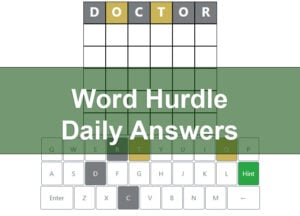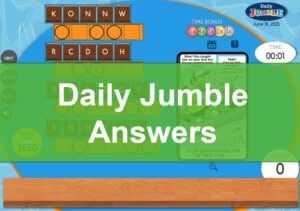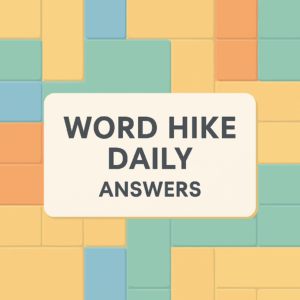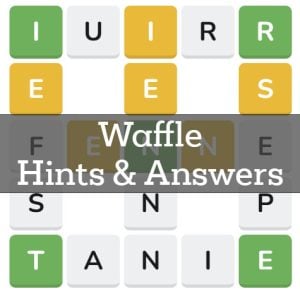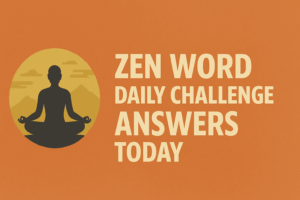Looking for the answers and hints for the Quordle puzzle from July 7, 2025? You’ve come to the right place! Every day, we archive the solutions to help you check your work or get that final clue you need. Below you will find all the answers for yesterday’s Quordle challenge.
Quordle Hints for July 7, 2025
Here are all the official hints to guide you toward the solution.
Word 1 Hints:- The word has the pattern consonant, vowel, consonant, consonant, vowel.
- The word is an adjective and often describes a type of humor or personality.
- This term is related to things that are amusing in an odd or whimsical way.
- You might use this word to describe a jesting remark or someone who is comically unusual, often in a wry or understated manner.
- This word rhymes with a small, narrow stream often found in rural areas.
- The second word contains one vowel that appears in the middle; the rest are consonants with no repeats.
- This is a noun that also functions as an agreement between conflicting parties.
- It falls under the category of conflict resolution and diplomacy.
- This term is often used in the context of a temporary pause in hostilities, especially in wartime or heated negotiations.
- You might call for this when you want to stop fighting and propose a period of peace to negotiate terms.
- Letter pattern hint: This word has only one vowel, which is not at the beginning or the end, and is surrounded by two different consonants on either side. The last two letters are the same as the first two but in reverse order.
- Word type hint: This is a verb that denotes a physical action and can also be used as a noun in certain contexts.
- Semantic hint: It's often associated with dance or gymnastics, describing a spinning movement.
- Context hint: You might see someone doing this with elegance and grace on the stage of a ballet or when someone is trying to feel the texture of a fabric between their fingers.
- Strategic hint: Imagine a figure skater performing a graceful rotation on the ice, or a child spinning around quickly in circles.
- The word has a structure of a single consonant followed by a vowel, then three more consonants, ending with a vowel.
- This is a conjunction that is used to connect clauses or sentences, often indicating a reason or cause.
- It falls under the category of temporal expressions, referring to time in a general sense.
- You would typically use this word when explaining why something is happening now based on an event from the past.
- It starts with the same letter as the term 'synchronize' and ends with the same sound you'd hear in the word 'peace'.
Spoiler Warning!
The final answers are below. Stop scrolling now if you want to solve it yourself!
Quordle Answer for July 7, 2025
Here is the final, official answer for the Quordle puzzle that was released on July 7, 2025.
The word droll is an adjective that describes something amusing in an odd or whimsical way. For example, one might say, "The play's droll characters had the audience laughing with their eccentric antics." The term has its origins in the Middle Dutch word 'drol', meaning a fat little man or a dwarf, and later came to refer to a buffoon or someone who performs amusing antics. Players might have found 'droll' challenging due to the uncommon combination of the consonant 'dr' at the beginning and the less usual 'oll' ending, which is not as common as the 'oll' in words like 'doll' or 'troll'.
Word #2:Truce is a noun that refers to a temporary stoppage of a war or dispute, agreed upon by all involved parties. You might hear it in a sentence like, "The two sides negotiated a truce to allow relief aid to reach civilians." The word comes from Middle English, derived from the Old French word 'trues', which means a pause or ceasefire in conflict. The term itself traces back to a medieval practice of agreeing to a 'truth' or a pledge to hold off hostilities. 'Truce' could confuse Quordle players due to the combination of 'tr' at the start and the unique 'uce' ending which isn't a common word ending pattern, making it slightly more difficult to guess.
Word #3:Twirl is a verb that means to spin around quickly or cause something to spin around. One might say, "She liked to twirl her hair around her finger when she was nervous." This word comes from the Middle English 'twirlen', which possibly arose from a blend of 'twist' and 'whirl'. The playful nature of the word captures the spinning motion it describes. For Quordle players, identifying 'twirl' might have been challenging due to the presence of a 'w' directly after the 't', which is not typical in English words, and the combination of 'irl' which could be confusable with words like 'girl' or 'swirl'.
Word #4:The word since is most commonly used as a preposition or a conjunction, and it means from the time that or continuously from the time when something happened, or because of the reason that something happened. For example, "She’s changed a lot since high school," or, "Since you're not interested, I'll go to the concert with someone else." 'Since' is derived from the Old English 'siththan', which is a combination of 'sið' (after) and 'than' (then). This might have tripped up Quordle participants due to its usual role as a connector in sentences rather than a standalone word they might expect to find in a word puzzle.
Read More Daily Game Answers
Check out the answers and hints for our other popular daily word games and puzzles.


